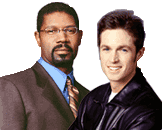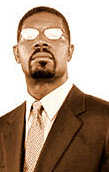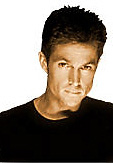CBS
CBS Summer Press
Tour
 During the summer, before the new television season
officially started, television critics from across the country
came to southern California for the CBS Summer Press Tour. The
stars of Now And Again, along with executive producer
Glenn Gordon Caron, answered many questions about this new Friday
night series.
During the summer, before the new television season
officially started, television critics from across the country
came to southern California for the CBS Summer Press Tour. The
stars of Now And Again, along with executive producer
Glenn Gordon Caron, answered many questions about this new Friday
night series.
One critic asked about the open-ended nature of the first
episode. Since the conflicts of the first episode are left
unresolved, did the producers worry that this might alienate the
audience?
Glenn Gordon Caron: No...I think it, hopefully, will
intrigue the hell out of people. It will compel them to come
back. I think the neatness and the predictability of television
is one of the things that makes it difficult to get passionate
about some of it.
Another critic pointed out that the title of the show, Now
And Again, is very similar to a new ABC show called, Once
and Again. Did the producers ever consider changing the
name?
Glenn Cordon Caron: We were well into our pilot before
we realized that there was another show with a similar title. I
mentioned it to Les Moonves, and he said, "Let them worry
about us." And I thought, whenever you can get a network
head so bullish about your show, you don't want to do anything to
diminish that. So, I took Les' confidence in the show as a great
sign, and we're just charging ahead.
One critic mentioned the NAACP report that strongly criticized
the television networks for the shortage of non-white characters.
One of the principal characters on Now And Again, Dr.
Theodore Morris, is played by an African-American actor, Dennis
Haysbert. The critic asked if this role was originally written
for a white actor.
Glenn Cordon Caron: No, it was actually written to be
played by a black man. I had this image in my head from the
beginning that when this person effectively woke up from the
dead, there was this beautifully-dressed, elegantly-spoken black
man sitting at the end of his bed. I can't explain why to you,
but it had nothing to do with the [NAACP] controversy.
 As a follow up to this statement, a critic asked
Dennis Haysbert if he considered himself to be "beautiful
and elegant"?
As a follow up to this statement, a critic asked
Dennis Haysbert if he considered himself to be "beautiful
and elegant"?
Dennis Haysbert: For lack of anything else, yes. Why
not?...I've been dreaming about a role like this my entire
career. And I have to take my hat off to Glenn for writing this
character...And hopefully, this will, open some doors for other
actors that don't walk around with their pants halfway down their
butts and use the "N" word every time they have a
chance.
One critic asked about the unusual premise of the show. Where
did the idea originally come from, and how did it evolve?
Glenn Cordon Caron: Les [Moonves] approached me - it
was very gratifying - he approached me and said, "How about
coming back and doing some television for us? I'll let you do
whatever you want." He basically made me a deal that allowed
me to do whatever I wanted.
I remembered as a kid seeing Damn
Yankees. There's the part where this guy
wants to play for the Washington Senators. He's like
50-years-old, and he just sits and curses at the television when
the Yankees play the Senators. He wants to be a Senator.
And his wish is granted by the Devil, and he's turned
into a young, strapping - I think, Tab Hunter. He goes and plays
for the Washington Senators, and no sooner does he become
everything that he wants to be, that he realizes that the thing
he most wants in life, really, is to be back with his wife.
And that moment made a big impression on me when I was
eight or nine...It sort of grew out of that notion.
Another critic asked series star Eric Close how it felt to
portray a man who is supposed to be in "perfect"
physical condition. Was it difficult to get ready for such a
role?
 Eric Close: One thing as an actor
that I never really liked is the appearance part of it and the
physical part of it. It's always been kind of a struggle to get
me in the gym to work out and do that kind of stuff. So, I get
cast in this part and I go home and start looking at the script.
Eric Close: One thing as an actor
that I never really liked is the appearance part of it and the
physical part of it. It's always been kind of a struggle to get
me in the gym to work out and do that kind of stuff. So, I get
cast in this part and I go home and start looking at the script.
I was like, "What size is my waist supposed to
be?" And the script says 29. I haven't been 29 since, well,
maybe elementary school.
So I raced to my trainer and said, "Look, I've
got ten days to get in shape for this show." Basically what
he said was, "This is food. You don't get anymore," and
"These are weights. You will lift them for nine days for 24
hours a day."
 During the summer, before the new television season
officially started, television critics from across the country
came to southern California for the CBS Summer Press Tour. The
stars of Now And Again, along with executive producer
Glenn Gordon Caron, answered many questions about this new Friday
night series.
During the summer, before the new television season
officially started, television critics from across the country
came to southern California for the CBS Summer Press Tour. The
stars of Now And Again, along with executive producer
Glenn Gordon Caron, answered many questions about this new Friday
night series.  As a follow up to this statement, a critic asked
Dennis Haysbert if he considered himself to be "beautiful
and elegant"?
As a follow up to this statement, a critic asked
Dennis Haysbert if he considered himself to be "beautiful
and elegant"?  Eric Close: One thing as an actor
that I never really liked is the appearance part of it and the
physical part of it. It's always been kind of a struggle to get
me in the gym to work out and do that kind of stuff. So, I get
cast in this part and I go home and start looking at the script.
Eric Close: One thing as an actor
that I never really liked is the appearance part of it and the
physical part of it. It's always been kind of a struggle to get
me in the gym to work out and do that kind of stuff. So, I get
cast in this part and I go home and start looking at the script.